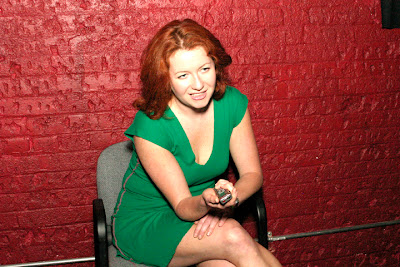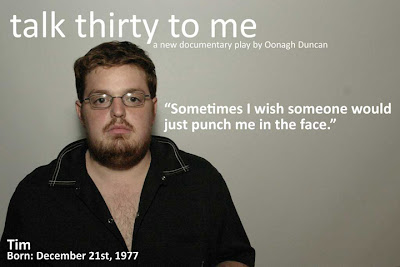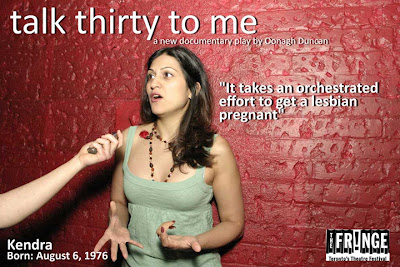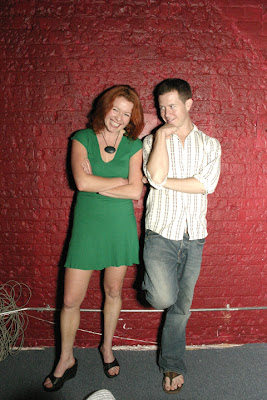 1) What the fuck is going on?
1) What the fuck is going on?
Well, on a global scale, I suppose global warming.
Much more importantly, my company, Oyster Productions, is about to open its inaugural production; a documentary play called Talk Thirty To Me. It’s an example of verbatim theatre, which means that every word in the play was said in ‘real life’. In this case, the play is entirely comprised of transcripts from interviews I conducted with dozens of Toronto area 29-year-olds in which I asked them how they felt about turning 30.
2) Why verbatim theatre?
The thing I love most about verbatim theatre is that it forces you to get out there and start talking to people. It also demands an outcome that is directly reflective and responsive to what the community is interested in, since it is their words that ultimately make up the play. If no one is interested in talking about it, there can’t be a play about it (and thank God for that!).
I also think it’s so fascinating to recognize and celebrate how people actually talk – with the stutters, slang, incomplete sentences, how often everyone says ‘like’. And I think audiences often like knowing that what they are watching is ‘based on a true story’, especially when the material is particularly outrageous. Truth really is stranger – and funnier – than fiction.
3) Have you found that certain kinds of stories lend themselves to verbatim methods?
Well, I think people tend to assume that documentaries in general are usually political or with otherwise earnest intentions. In pitching my show to hardcore documentary fans, I sometimes feel a little sheepish about the (mostly) fluffy subject. But in general, I would say that the stories that are best for verbatim theatre are ones that people need to talk about – particularly if it’s something that is either happening in that moment or just about to happen. But that’s really a general theatre rule – nobody is particularly interested in watching a show where nobody cares about something that has already happened, obviously.
 4) Does Oyster Productions’ Fringe show, Talk Thirty to Me, arrive at any conclusions about what it means to turn 30 years old?
4) Does Oyster Productions’ Fringe show, Talk Thirty to Me, arrive at any conclusions about what it means to turn 30 years old?
Ha! Well, the overall consensus of my interviewees is that one is unquestionably an “adult” at 30. So people tend to sort of check in with themselves and compare their childhood expectations of ‘adulthood’ to the reality of themselves at 30.
5) How much of your artistic process is informed by a sense of anger?
None! (I’ll fucking kill you for even suggesting it.)
6) How do you feel about your time at London’s East 15 Acting School?
Oh, God. It was a year of emotional self-flagellation, unnecessary nudity and amazing friendships. Theatre school at its best.
7) Do you have a working definition of what it means to be an artist?
No – although I did just spend a good five minutes staring into space trying to come up with something clever. Maybe it’s someone who does something that doesn’t feel like work?
8) What was the single most memorable thing you learned from Richard Rose?
That what a director does is manipulate action in time and space. These are your tools. (I spent a lot of time barking at my poor actors about motivation and obstacles, having just emerged from the East 15 womb. At least I let them keep their clothes on.)
9) What theatre-related topic is most likely to send you into a heated debate?
Oh God. Where to go for drinks after the show.
 10) When you look at the varied landscape of Canadian theatre, what are you most optimistic about?
10) When you look at the varied landscape of Canadian theatre, what are you most optimistic about?
Well, to be honest, I rarely do look at the varied landscape of Canadian theatre (see above), but generally I am very optimistic. I know that there are always way more interesting shows going on than I can get to, and every day I meet fascinating, talented people with cool ideas to execute so the future looks good to me. I heard the other day that one has a better chance of winning the Heart and Stroke Foundation lottery than the Fringe lottery, which can obviously elicit the standard grumble about how the arts are underfunded and there are not enough spots to go around, etc. But that also means that there are hundreds of people out there who want to make theatre. So that’s pretty awesome.

This made me laugh:
7) Do you have a working definition of what it means to be an artist?
“No – although I did just spend a good five minutes staring into space trying to come up with something clever. Maybe it’s someone who does something that doesn’t feel like work?”
Maybe an artist is someone who can come up with funny shit like that!
Holy hell, the “Tim” poster just made me laugh coffee out of my nose. I would see the play just based on that.
Hey Oonagh,
Had a lengthy discussion about your answer to question number 8 last night with some friends. Thanks!
Ian